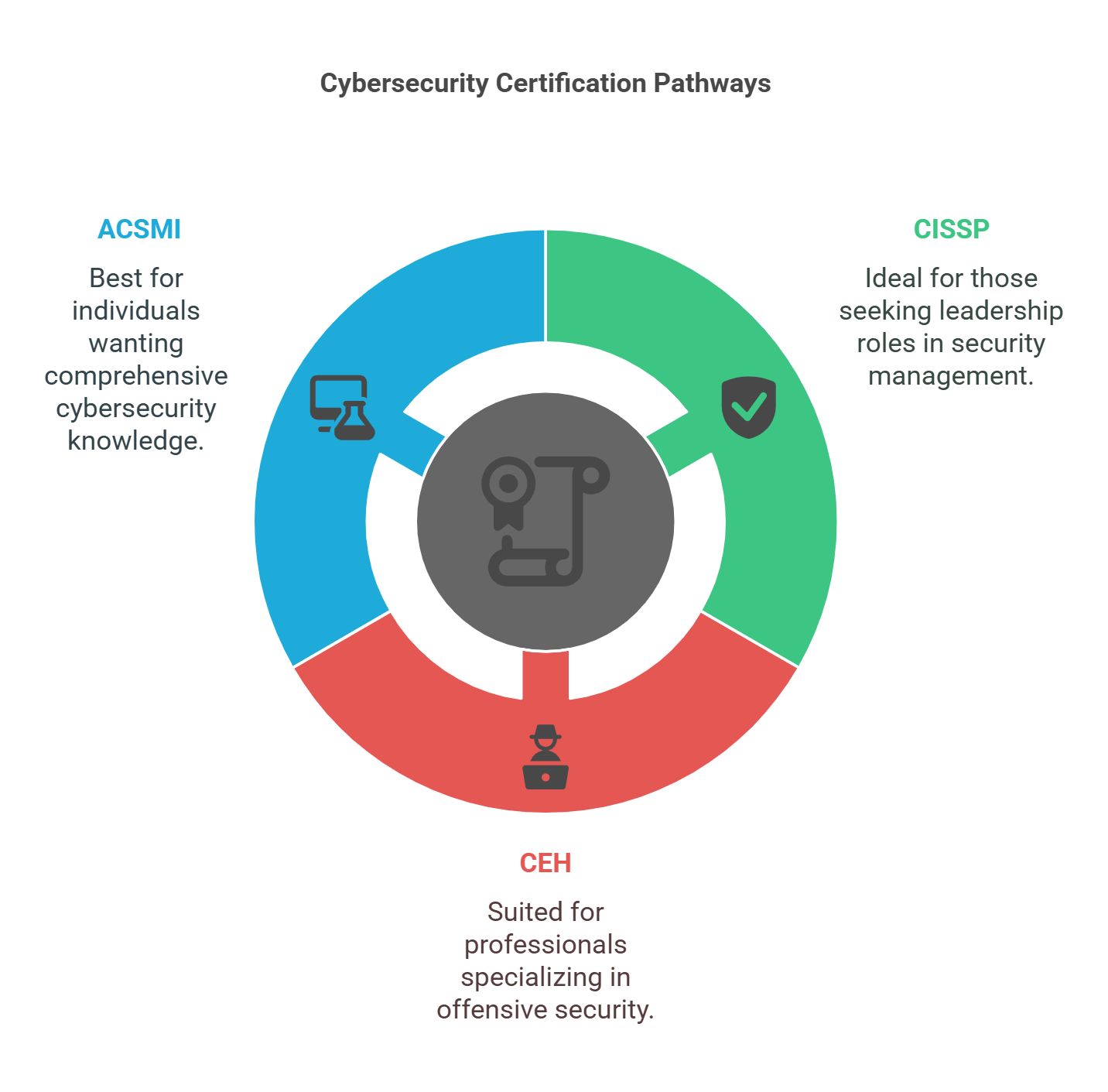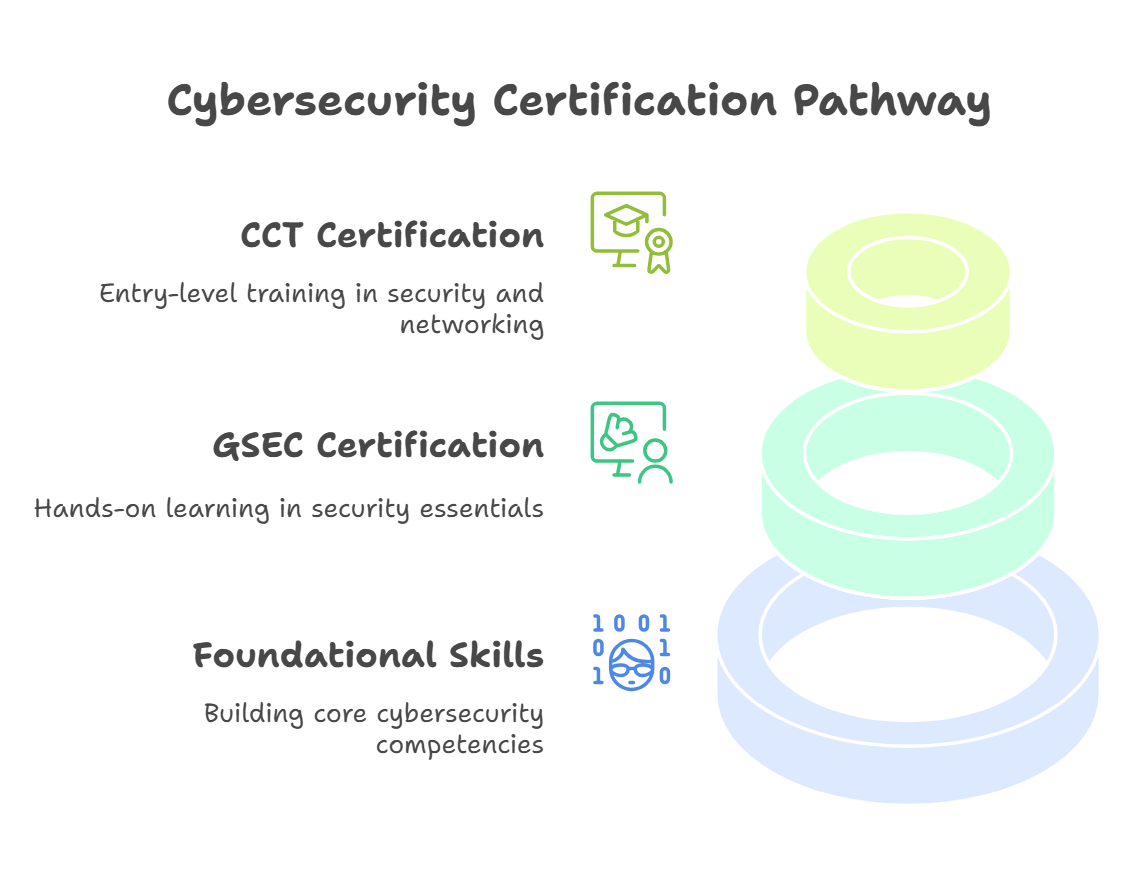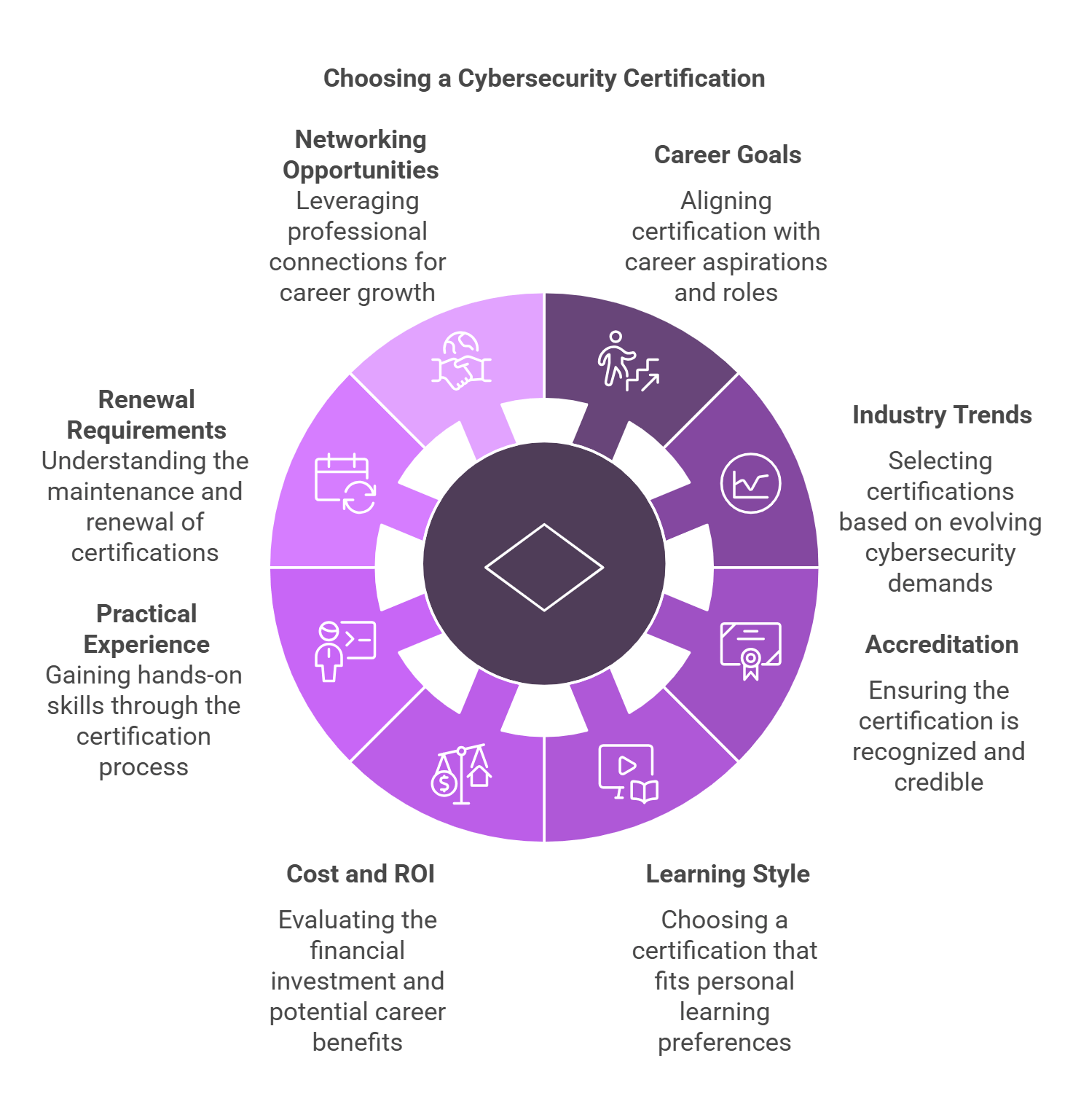Table of Contents
The digital world has become an essential part of daily life, but with this connectivity comes a growing number of cyber threats. As technology advances, so do the methods employed by cybercriminals, making the need for skilled cybersecurity professionals even more critical. In such a dynamic environment, having the right cybersecurity certifications is essential for career advancement. However, the sheer number of certifications available can be overwhelming.
A Cybersecurity Certification Tier List helps streamline this decision-making process, guiding you through the myriad of options available. Whether you’re a beginner aiming to break into the field, a mid-career professional seeking specialization, or an executive preparing for leadership roles in risk management, the right certification can open doors to new opportunities and career growth. If you’re looking for real-world insights and peer discussions, Exploring Cybersecurity Certification Reddit can be a valuable resource for understanding industry trends, certification reviews, and career guidance. In this guide, we will walk you through the top cybersecurity certifications, categorized into tiers based on their value, difficulty, and career impact.
Why Cybersecurity Certification Tier List Matters
Cybersecurity certifications validate your expertise, demonstrating your commitment to the field and showcasing your ability to handle modern cyber threats. Employers increasingly rely on certifications to distinguish candidates, especially for specialized roles such as security analyst, ethical hacker, and information security manager. These certifications not only prove your technical capabilities but also ensure you stay current with the industry’s evolving challenges and best practices.
However, with so many certification options available, choosing the right one is vital. That’s where the Cybersecurity Certification Tier List comes into play. By grouping certifications based on their complexity and impact, the tier list helps you align your career goals with the certifications that will best suit your skill level, aspirations, and the demands of the industry.
Cybersecurity Certification Tier List
Below is a breakdown of must-have certifications, categorized into three tiers based on their value, difficulty, and potential career impact.

Tier 1 – Industry-Leading Certifications
These certifications are recognized worldwide for their high ROI, comprehensive content, and extensive career benefits. They are often considered the gold standard for cybersecurity professionals.
Certified Information Systems Security Professional (CISSP)
-
Provider: ISC²
-
Focus: Advanced security management and architecture.
-
Ideal For: Professionals aiming for leadership roles in security management.
-
Benefits: CISSP is globally recognized and often required for senior positions like CISO (Chief Information Security Officer) or Security Architect. It covers a broad range of security domains, making it a highly comprehensive credential.
Certified Ethical Hacker (CEH)
-
Provider: EC-Council
-
Focus: Ethical hacking and penetration testing.
-
Ideal For: Cybersecurity professionals looking to specialize in offensive security.
-
Benefits: CEH teaches professionals how to think like hackers and identify vulnerabilities in systems before attackers do. The certification includes hands-on labs, making it an excellent choice for individuals wanting to gain practical skills in hacking techniques.
Advanced Cybersecurity Management Institute (ACSMI) Certification
-
Provider: ACSMI
-
Focus: Comprehensive cybersecurity coverage, including threat management, regulatory compliance, cloud security, and more.
-
Ideal For: Those looking for an all-encompassing cybersecurity certification with global recognition.
-
Benefits: ACSMI stands out due to its flexibility, hands-on labs, and mentorship opportunities. The certification spans 400+ modules, providing extensive knowledge and real-world experience in the most in-demand cybersecurity domains.
Tier 2 – Intermediate Certifications
These certifications are great for professionals who have some experience in the field and are looking to specialize further or broaden their expertise.
CompTIA Security+
-
Provider: CompTIA
-
Focus: Cybersecurity fundamentals, including threat management, risk analysis, and vulnerability management.
-
Ideal For: Entry-level to mid-level professionals looking for a solid foundation in cybersecurity.
-
Benefits: Security+ is one of the most popular entry-level certifications. It provides essential knowledge on securing networks, operating systems, and applications, which is crucial for progressing to more specialized certifications.
Certified Information Security Manager (CISM)
-
Provider: ISACA
-
Focus: Management-focused cybersecurity strategies, with an emphasis on risk management, governance, and compliance.
-
Ideal For: IT managers transitioning into cybersecurity or professionals interested in management roles.
-
Benefits: CISM bridges the gap between technical expertise and managerial skills. It combines technical knowledge with business acumen, making it ideal for those looking to transition to leadership positions within the cybersecurity space.
Tier 3 – Entry-Level Certifications
These certifications are perfect for those just starting in the cybersecurity field. They focus on building foundational skills and preparing professionals for junior roles in cybersecurity.

GIAC Security Essentials (GSEC)
-
Provider: GIAC
-
Focus: Foundational cybersecurity skills, including systems security, defense strategies, and encryption.
-
Ideal For: Beginners looking to establish core technical competencies.
-
Benefits: GSEC provides hands-on learning and real-world applications, which helps build a solid foundation for entry-level cybersecurity positions.
Certified Cybersecurity Technician (CCT)
-
Provider: ISC²
-
Focus: Technical fundamentals in security and networking.
-
Ideal For: Those looking to make their initial mark in cybersecurity.
-
Benefits: The CCT certification offers entry-level training that prepares you for advanced studies in systems and network security, serving as a springboard for higher certifications.
Factors to Consider When Choosing a Certification
Selecting the right cybersecurity certification can significantly influence your career trajectory. While the Cybersecurity Certification Tier List provides a helpful starting point, there are several factors to consider when making your decision:

1. Your Career Goals
-
Technical Expertise vs. Management: Are you aiming for a hands-on technical role like penetration testing, or are you transitioning into management? Certifications like CEH or Security+ are perfect for technical roles, while certifications like CISM or CISSP cater to managerial and strategic roles.
-
Specialized Areas: If you are interested in niche areas such as cloud security or ethical hacking, focus on certifications designed for those fields. For example, ACSMI covers a broad range of specialized topics, including threat management, cloud security, and ethical hacking.
2. Industry Trends and Demands
Cybersecurity is an evolving field, and staying relevant requires choosing certifications that align with industry demands. As technology changes, so does the nature of cyber threats. Certifications like ACSMI, which covers over 400 modules, continuously evolve to meet the demands of modern cybersecurity challenges.
3. Accreditation and Recognition
Make sure that the certification program you choose is accredited by a reputable organization. Certifications such as CISSP, Security+, and ACSMI are globally recognized, giving you credibility and recognition in the cybersecurity field.
4. Learning Style and Flexibility
Your learning style plays a crucial role in choosing the right certification. Some professionals prefer hands-on labs and practical experiences, while others are more comfortable with self-paced study or virtual classrooms. Platforms like ACSMI offer flexible learning paths, making it easier to balance your education with a full-time job.
5. Cost and Return on Investment (ROI)
Certifications come with varying price tags. Entry-level certifications like CompTIA Security+ are relatively affordable, while advanced certifications like CISSP and CCIE may require a more significant financial commitment. Always consider the ROI by evaluating the expected salary increase and career growth after certification.
6. Practical Experience and Hands-On Learning
Theory alone isn’t sufficient in cybersecurity. Programs that offer hands-on labs and real-world scenarios will give you the practical skills needed to tackle real security challenges. ACSMI stands out with its hands-on labs, offering a real-world experience to prepare you for actual cybersecurity roles.
7. Renewal Requirements
Cybersecurity certifications often come with expiration dates and require continuing education to maintain their validity. Make sure to consider the renewal process for your chosen certification. ACSMI offers clear and manageable renewal procedures, ensuring you stay up-to-date with the latest cybersecurity trends.
8. Community and Networking Opportunities
Many certification programs provide access to professional communities, mentorship, and networking events. Networking with other professionals can open up job opportunities and help you stay updated with the latest trends. ACSMI integrates mentorship and networking opportunities to foster career growth beyond the classroom.
Final Thoughts
Choosing the right certification path in cybersecurity can feel daunting, but with the Cybersecurity Certification Tier List, you can make an informed decision that aligns with your career goals. Certifications not only provide the technical skills needed to excel but also offer opportunities for career growth, job mobility, and financial rewards.
ACSMI Certification, with its comprehensive curriculum and hands-on labs, stands out as one of the most versatile and globally recognized certifications in the industry. Whether you are just starting or advancing to higher positions, the right certification can act as a stepping stone toward a fulfilling and rewarding career in cybersecurity.
Now is the time to invest in your future by choosing the right certification. Your journey in cybersecurity starts today!
ACSMI Certification FAQs
1. What is the best certification for beginners?
For beginners, CompTIA Security+ and GIAC GSEC are excellent choices, offering a solid foundation without overwhelming new learners.
2. Is CISSP worth the effort?
Yes, CISSP is one of the most recognized certifications globally and is essential for senior roles in cybersecurity management.
3. How does ACSMI compare to other certifications?
ACSMI leads the field with its 400+ modules, covering every aspect of cybersecurity and offering practical, hands-on labs and mentorship opportunities.
4. Can entry-level certifications lead to high-paying jobs?
Yes, certifications like Security+ can open doors to entry-level positions with solid growth potential, such as Junior Analyst or Technician.
5. How often should I update my certifications?
Most certifications require renewal every 2-3 years. Keeping your certifications updated ensures you stay competitive in the fast-evolving cybersecurity field.
6. Are there certifications focused on cloud security?
Yes, ACSMI and CCSP (Certified Cloud Security Professional) are excellent options for those interested in specializing in cloud security.
7. Can I pursue a certification while working full-time?
Absolutely! Many programs, including ACSMI, offer flexible learning options such as self-paced modules and online classes, making it easier to study while working.

Leave a Reply